What is a Mobile AI Application and What are its Uses?
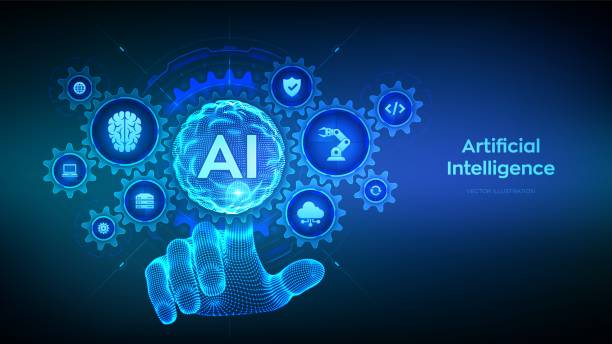
What is a Mobile AI Application and What are its Uses?
In today’s world, #Artificial_Intelligence (AI) is rapidly penetrating various aspects of our lives.
One of the most important arenas for this penetration is smartphones.
Mobile AI applications refer to programs that utilize artificial intelligence algorithms to perform various tasks.
These tasks can include facial recognition, language translation, answering questions, content recommendation, and many other things.
Uses of Mobile AI Applications:
- Voice Assistants: Siri, Google Assistant, and Alexa are examples of voice assistants that use AI to understand and respond to user voice commands.
- Language Translation: Apps like Google Translate use AI to translate texts and conversations into different languages.
- Facial Recognition: This feature is used to unlock phones, identify people in photos and videos, and for authentication.
- Content Recommendation: Music, movie, and TV series streaming apps use AI to suggest content that is likely to be of interest to the user.
- Photo and Video Quality Enhancement: Photo and video editing apps use AI to improve image quality, remove noise, and add special effects.
- Health and Medical: Medical applications can use AI to help diagnose illnesses, provide treatment solutions, and monitor a patient’s health status.
- Games and Entertainment: Mobile games use AI to create smart enemies, challenging levels, and a more engaging user experience.
In summary, mobile AI applications are powerful tools that can help us in many areas.
With technological advancements, it is expected that the applications of these types of apps will become more widespread and sophisticated in the future.
Therefore, understanding this technology is essential for everyone who uses smartphones.
Do you dream of a thriving online store but don’t know where to start?
Rasaweb is your comprehensive e-commerce website design solution.
✅ Attractive and user-friendly design
✅ Increased sales and revenue⚡ Get free consultation
Introducing the Best Mobile AI Applications in 2024
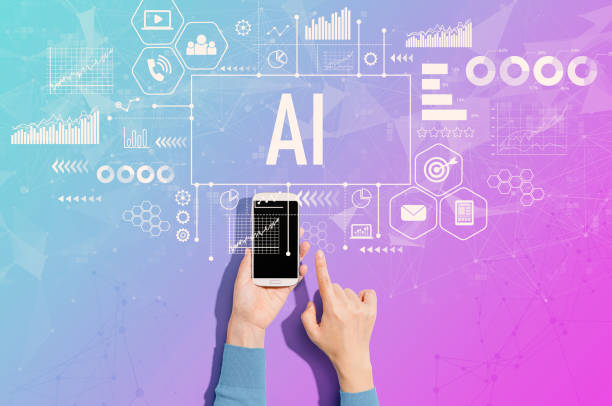
Introducing the Best Mobile AI Applications in 2024
With the increasing progress of artificial intelligence, the number of mobile AI applications is growing.
Choosing the best application among all these options can be difficult.
In this section, we will introduce some of the best mobile AI applications in 2024:
- Google Assistant: Google’s powerful voice assistant that can help you with various tasks, including setting reminders, sending messages, playing music, and answering questions.
Find more information about Google Assistant on Wikipedia. - Microsoft Pix Camera: This camera app uses AI to improve photo quality, detect scenes, and automatically adjust camera settings.
- ELSA Speak: An English language learning app that uses AI to detect accent and provide personalized feedback to improve pronunciation.
- YouCam Makeup: This app allows you to try virtual makeup and improve your skin using AI.
- Replika: An AI-powered chatbot that helps you express your feelings and talk to a virtual friend.
- Wysa: A mental health app that uses AI to provide emotional support, mindfulness exercises, and stress management solutions.
These are just a few examples of the best mobile AI applications available in the market.
Based on your needs and interests, you can choose the right app and benefit from the advantages of AI in your daily life.
Before installing any app, be sure to read other user reviews to ensure its performance and features.
How to Choose a Suitable Mobile AI Application?
![]()
How to Choose a Suitable Mobile AI Application?
Choosing a suitable mobile AI application requires considering several factors.
In this section, we will examine these factors so you can make an informed choice:
- Define your needs: First and foremost, determine what type of app you need.
Are you looking for a voice assistant, a language translation app, a photo editor, or a mental health tool? - Features and Capabilities: Review the app’s features and capabilities.
Does the desired app meet all your needs? - User Reviews: Read other users’ reviews about the app.
These reviews can provide useful information about the app’s performance, features, and weaknesses. - Security and Privacy: Ensure that the app has high security and adequately protects your personal information.
- Price: Consider the app’s price.
Is it worth paying for? Is there a free version with more limited features? - Compatibility: Ensure that the app is compatible with your device.
By considering these factors, you can choose a suitable mobile AI application that helps you with various tasks and makes your life easier.
Remember that no app is perfect, and you may need to try several different apps to find the best option.
| Feature | Description |
|---|---|
| Accuracy | The degree of correctness of AI performance in tasks |
| Speed | Speed of information processing and response delivery |
| Efficiency | Optimal utilization of hardware resources |
Challenges and Limitations of Mobile AI Applications

Challenges and Limitations of Mobile AI Applications
Despite numerous advantages, mobile AI applications also face challenges and limitations.
In this section, we will examine these challenges:
- Hardware Resource Limitations: Smartphones have limited hardware resources compared to servers and desktop computers.
This limitation can affect the speed and efficiency of AI applications. - Battery Consumption: Heavy AI processing can lead to high battery consumption.
- Privacy: AI applications often require access to user personal information.
This can raise concerns about privacy. - Accuracy and Correctness: AI algorithms are not yet perfect and may make mistakes in some cases.
- Bias: AI algorithms can be biased based on their training data.
This bias can lead to unfair or discriminatory results.
By being aware of these challenges and limitations, you can use mobile AI applications more responsibly and knowingly.
Additionally, developers should strive to address these challenges and provide safer, more efficient, and fairer AI applications.
Did you know that 94% of users’ first impressions of a business are related to its website design? With professional corporate website design by **Rasaweb**, turn this first impression into an opportunity for growth.
✅ Attract more customers and increase sales
✅ Build credibility and trust in the audience’s eyes⚡ Get a free website design consultation!
The Future of Mobile AI Applications

The Future of Mobile AI Applications
The future of mobile AI applications looks very bright and promising.
With technological advancements, these applications are expected to become more powerful, efficient, and comprehensive.
In this section, we will explore some key trends in the future of mobile AI applications:
- On-Device Processing: Instead of sending data to a server for processing, AI algorithms are processed directly on the mobile device.
This increases speed, reduces battery consumption, and improves privacy. - Reinforcement Learning: This technique allows applications to learn by interacting with their environment and improve their performance.
- Generative AI: This type of AI can generate new content such as text, images, music, and video.
- More Personalization: Applications will provide a highly personalized user experience by using data collected from the user.
- Integration with Other Technologies: Mobile AI applications will integrate with other technologies such as the Internet of Things (IoT) and Augmented Reality (AR) to offer new and innovative experiences.
To better understand the Internet of Things, read the Wikipedia page.
Given these trends, it can be expected that mobile AI applications will play a more significant role in our lives in the future and help us with various tasks, learning, entertainment, and communication with others.
Developers and researchers are striving to create safer, more efficient, and fairer AI applications.
Security Tips for Using Mobile AI Applications

Security Tips for Using Mobile AI Applications
Given the increasing importance of privacy and data security, it is necessary to observe security tips when using mobile AI applications.
In this section, we will examine these tips:
- Download from Reputable Sources: Only download applications from official app stores like Google Play Store and Apple App Store.
- Check Permissions: Before installing an app, review its requested permissions.
If the app requests access to information it doesn’t need, refrain from installing it. - Updates: Regularly update apps to benefit from the latest security patches.
- Strong Password: Use strong and unique passwords for your user accounts.
- Two-Factor Authentication: Enable two-factor authentication for your user accounts.
- Beware of Phishing: Be cautious of suspicious emails and messages that ask for your personal information.
- Privacy Settings: Check the privacy settings of applications and ensure that your personal information is properly protected.
By observing these security tips, you can use mobile AI applications with greater peace of mind and protect your personal information.
Remember that data security is a shared responsibility between the user and the developer.
Comparing Mobile AI Applications with Cloud-Based AI

Comparing Mobile AI Applications with Cloud-Based AI
Mobile AI applications and cloud-based AI are two different approaches to implementing artificial intelligence.
In this section, we will compare these two approaches:
| Feature | Mobile AI Application | Cloud-Based AI |
|---|---|---|
| Processing | On the mobile device | On cloud servers |
| Speed | Higher (due to no data transfer requirement) | Lower (due to data transfer requirement) |
| Battery Consumption | More optimized | More |
| Privacy | Better (due to no data transfer to server) | Lower (due to data transfer to server) |
| Processing Power | Limited (due to hardware resource limitations) | Higher (due to powerful servers) |
| Access | No internet required | Requires internet connection |
In summary, mobile AI applications are more suitable for tasks that require speed, privacy, and offline access.
Cloud-based AI is more suitable for tasks that require high processing power and access to large datasets.
The choice between these two approaches depends on specific needs and conditions.
The Impact of Mobile AI Applications on Daily Life
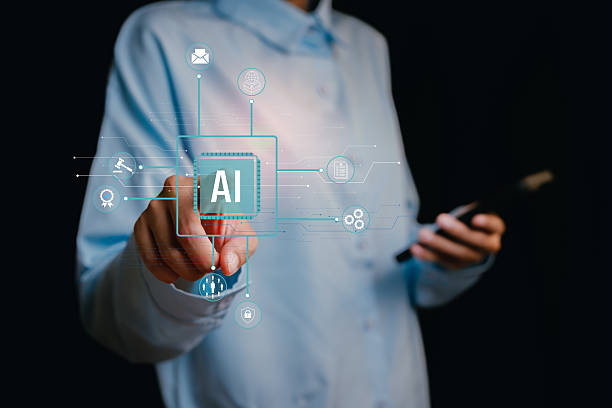
The Impact of Mobile AI Applications on Daily Life
Mobile AI applications are increasingly impacting our daily lives.
In this section, we will examine some of these impacts:
- Improved Productivity: Voice assistants, reminder, and organization apps help us perform our tasks more efficiently and manage our time.
- Easy Access to Information: Search engines, language translation apps, and educational tools make our access to information easier and faster.
- Health Improvement: Health apps, fitness programs, and health monitoring tools help us take care of our health.
- Entertainment and Leisure: AI games, music and video streaming apps, and creative tools enhance our entertainment and leisure.
- Communications: Messaging apps and social networks make our communication with friends, family, and colleagues easier and faster.
- Online Shopping: Mobile AI applications help us make better online purchases.
Overall, mobile AI applications help us lead easier, healthier, more productive, and more enjoyable lives.
With technological advancements, these impacts are expected to become more widespread and profound in the future.
Are you falling behind in the competition with large online stores?
Rasaweb, with professional e-commerce website design, brings your business online and increases your market share!
✅ Increase brand credibility and customer trust
✅ Easy shopping experience leads to more sales
⚡ Act now to get a free website design consultation!
Ethical Considerations in Developing and Using Mobile AI Applications
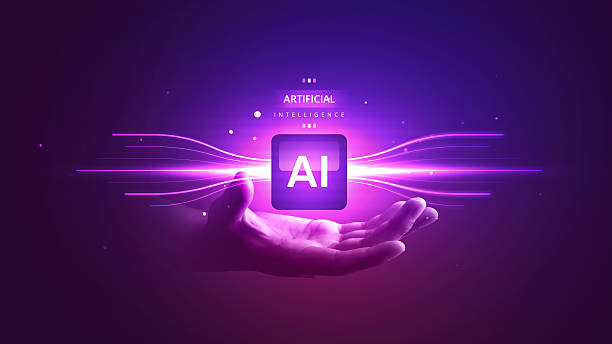
Ethical Considerations in Developing and Using Mobile AI Applications
The development and use of mobile AI applications come with important ethical considerations.
In this section, we will examine these considerations:
- Privacy: The collection and use of user personal information must be done with transparency and respect for privacy.
- Security: Applications must have high security and protect user information against unauthorized access.
- Transparency: AI algorithms must be understandable, and their decision-making process must be clear.
- Fairness: AI algorithms should not make decisions based on race, gender, religion, or other discriminatory factors.
- Accountability: Developers and users must take responsibility for the consequences of using AI applications.
- Misuse: The misuse of mobile AI applications for unethical or illegal purposes must be prevented.
Observing these ethical considerations is essential to ensure that mobile AI applications are used for the benefit of society and humanity.
Developers, policymakers, and users must collaborate to establish appropriate ethical frameworks for the development and use of AI.
How to Build a Mobile AI Application?
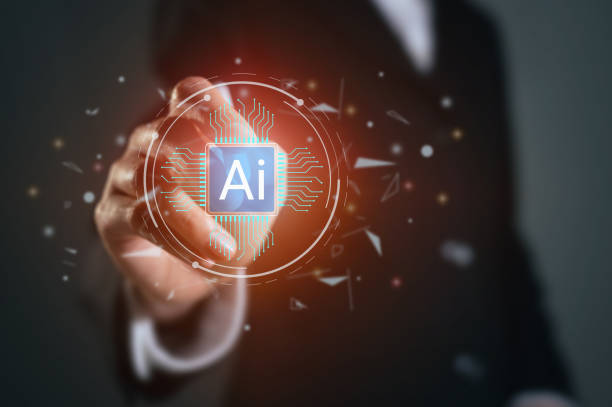
How to Build a Mobile AI Application?
Building a mobile AI application is a complex process that requires technical knowledge and skills.
In this section, we will examine the general steps of this process:
- Define the Goal: Specify the goal and application of your app.
- Data Collection: Collect the necessary data to train AI algorithms.
- Algorithm Selection: Choose the appropriate AI algorithm for the desired tasks.
- Model Training: Train the AI model using the collected data.
- App Development: Develop the mobile application using suitable programming languages (such as Java, Kotlin, Swift).
- Model Integration: Integrate the AI model into the application.
- Testing: Thoroughly test the application to ensure its correct functionality.
- Publishing: Publish the application in app stores.
To build a mobile AI application, you can use various AI tools and libraries such as TensorFlow Lite and Core ML.
Additionally, you can use cloud AI services like Google Cloud AI and Amazon AI.
If you lack sufficient knowledge and skills, you can seek help from a professional developer.
Building #programming# requires continuous research and practice.
Frequently Asked Questions
| Number | Question | Answer |
|---|---|---|
| 1 | What is a mobile AI application? | A mobile AI application is a program that uses artificial intelligence capabilities (such as machine learning, natural language processing, computer vision) to provide smarter and more automated experiences on mobile devices. |
| 2 | Why is AI important in mobile applications? | Its importance is due to increased efficiency, personalized user experience, task automation, improved decision-making, and innovative capabilities such as facial recognition or voice assistants. |
| 3 | What are some examples of mobile applications with AI? | Voice assistants (e.g., Siri, Google Assistant), navigation apps with real-time traffic (Google Maps), image filters (Snapchat, Instagram), language translation apps, and facial recognition applications. |
| 4 | What challenges exist in developing mobile AI applications? | Hardware limitations of mobile devices (processing power, battery), the need for large and high-quality data, maintaining user privacy, and the complexity of implementing AI models. |
| 5 | What is the role of machine learning in these applications? | Machine learning allows the application to learn from data, identify patterns, and improve its performance over time, such as in product recommendation systems or speech recognition. |
| 6 | Do mobile AI applications require an internet connection? | Many advanced AI capabilities require an internet connection and cloud processing, but some lighter models can also work “on-device” (without internet). |
| 7 | How does AI help improve the user experience on mobile? | By personalizing content, predicting user needs, automating repetitive tasks, and providing more natural user interfaces such as voice commands. |
| 8 | What is the difference between cloud AI and on-device AI in mobile? | Cloud AI uses powerful servers for processing (requires internet), while on-device AI performs processing directly on the phone itself (no internet required, but with processing limitations). |
| 9 | What will be the future of mobile AI applications? | We expect to see increased personalization capabilities, deeper integration with phone sensors, development of smarter assistants, and advancements in on-device processing. |
| 10 | Which frameworks are popular for mobile AI development? | TensorFlow Lite (for Android and iOS), Core ML (for iOS), PyTorch Mobile are among the popular frameworks for implementing AI models in mobile applications. |
And other services of Rasaweb Advertising Agency in the field of advertising
Smart Direct Marketing: An effective tool to increase sales with marketing automation.
Smart Content Strategy: A creative platform to improve customer behavior analysis with marketing automation.
Smart Link Building: Professional optimization for customer acquisition using key page optimization.
Smart Conversion Rate Optimization: Designed for businesses seeking customer acquisition through intelligent data analysis.
Smart Sales Automation: Professional optimization for increasing sales using attractive user interface design.
And over hundreds of other services in internet advertising, advertising consultation, and organizational solutions
Internet Advertising | Advertising Strategy | Advertorial
Sources
Top Mobile AI Applications in 2024The Impact of AI on SmartphonesComplete Guide to AI ApplicationsReview of Top Mobile AI Applications
? Rasaweb Afarin Digital Marketing Agency, your companion on the fast track to growing your business with professional services such as corporate website design and SEO optimization.
📍 Tehran, Mirdamad Street, next to Central Bank, Southern Kazeroun Alley, Ramin Alley No. 6

